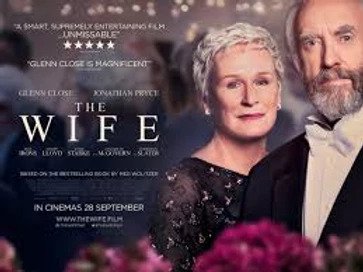It was the laughs that did it. They made me wonder whether we actually want to solve the #MeToo problem, or whether we get too much secondary gain from the righteous indignation we feel about being on one side or the other. It’s a serious question, because without the will to solve a problem, we will never solve it.

The laughs came when I saw the new movie ‘The Wife’, which I felt illustrated very clearly why we’re skirting round the #MeToo issue rather than addressing it. You don’t need this particular film (which is not a comedy) to understand this – there are plenty of other films, books, TV series etc that do the job just as well – but ‘The Wife’ is simple in its effectiveness.
Joe and Joan have been married for long enough that they’re expecting their first grandchild. He’s a novelist, she has put any career aspirations aside to be a dutiful wife. He then wins the Nobel Prize for literature, which takes them on an all-expenses-paid trip to Stockholm. And it’s on that media-infused trip that the sacrifices and compromises that have gone into making his career a success work themselves to the surface.
Things come to a head when they have a blazing row in their sumptuous hotel suite, in which all Joan’s frustrations come out, to be met by Joe’s frustrations about why Joan was frustrated and what he was supposed to have done differently. What was interesting for me was the reaction of the audience in the full cinema: there was largely silence as Joan (played superbly by Glenn Close) reeled off her anguish, the dam bursting with pent-up frustration about the selflessness she had shown, yet when Joe (an equally impressive Jonathan Pryce) gave his view of events, many people – I think they were largely female voices but I can’t be sure – laughed contemptuously and mockingly.
And yes, taken by the standards of what today’s young, affluent, educated professionals expect of the division of roles in a loving relationship, Joe’s ‘defence’ was at times pathetic. But the point that those laughing missed was that it was the world as he saw it, and was valid from that perspective. And this is the point – if we want to solve any problem, we have to understand how both (or all) sides see the situation. If you don’t do that, you will never get a solution that makes everyone feel heard.
This is at the heart of the #MeToo problem. It’s absolutely right that years of women being mistreated by powerful men is brought to the surface and addressed. It’s not just a matter of being fair to women, it’s about being fair to society, which is losing out because the talents of numerous people are being spurned just because they are of one gender but their boss is of another gender and playing out his power. Therein lies the power of the #MeToo movement.
But the problem won’t be solved if the way men see the world isn’t taken into account. That’s not to condone what (some) men may think or do, but it is to address it in a way that will allow them to feel heard in any evolving solution, otherwise you just swap one problem for another and create new resentments. Any mediator will tell you how often they hear two people’s version of events and end up wondering whether the two are describing the same story. There’s a saying I’ve heard quoted from the Talmud: ‘We see things not as they are but as we are.’
I’m not spoiling ‘The Wife’ by telling you that Joe and Joan talk past each other, and never resolve their clashing views of the marriage, partly because events overtake them and partly because the frustrations are too great for either to really listen (though Joan does a better job of listening than Joe). While the film is good, it’s not a great movie, but it sums up neatly how we don’t engage with opinions that don’t fit with our own view of the world. Joe and Joan could easily be metaphors for Remain and Leave, for pro- and anti-Trump, for tolerant internationalism and close-the-borders protectionism. We can convince ourselves we’re on the right side, but if we don’t try to understand the other side, we will never find a lasting solution.
Anyone running a cinema or film club who ends up showing ‘The Wife’ should not just show it but organise a discussion group afterwards to dissect the frustrations behind the differing ways Joe and Joan see things. Then the film could make a really significant contribution to understanding the frightening differences in today’s world.
